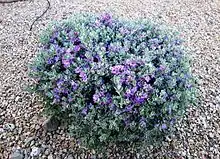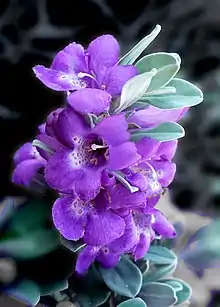Leucophyllum frutescens
Leucophyllum frutescens is an evergreen shrub in the figwort family, Scrophulariaceae, native to the state of Texas in the southwestern United States and the states of Coahuila, Nuevo León, and Tamaulipas in northern Mexico. Although commonly known as Texas sage, it is not a true sage and is distinct from the genus Salvia. The species is also called Texas Ranger, Texas rain sage, cenizo, Texas silverleaf, Texas barometerbush, ash-bush, wild lilac, purple sage, senisa, cenicilla, palo cenizo, or hierba del cenizo.
| Leucophyllum frutescens | |
|---|---|
_W2_IMG_1125.jpg.webp) | |
| Scientific classification | |
| Kingdom: | Plantae |
| Clade: | Tracheophytes |
| Clade: | Angiosperms |
| Clade: | Eudicots |
| Clade: | Asterids |
| Order: | Lamiales |
| Family: | Scrophulariaceae |
| Genus: | Leucophyllum |
| Species: | L. frutescens |
| Binomial name | |
| Leucophyllum frutescens | |
| Synonyms | |
| |
The solitary axillary flowers are bell- or funnel-shaped, with five lobes and two lips. This species is found in rocky, calcareous soils.[2]
Cultivation
Texas sage is a popular ornamental plant, commonly used for edge and area plantings in warmer and drier areas; it requires minimal water, is easily shaped into hedges, and blooms over the entire surface. It is available in a variety of cultivars, including 'Green Cloud', 'White Cloud', 'Compacta', 'Convent', and 'Bert-Star'.[3]
Ecology
L. frutescens is a host plant for the caterpillars of the theona checkerspot (Chlosyne theona)[4] and calleta silkmoth (Eupackardia calleta).[5]


References
- "Leucophyllum frutescens". Germplasm Resources Information Network (GRIN). Agricultural Research Service (ARS), United States Department of Agriculture (USDA). Retrieved 2010-04-11.
- "Texas Sage, Texas Ranger, Texas Rain Sage, Cenizo, Texas Silverleaf, Ash-bush, Wild Lilac, Purple Sage, Senisa, Cenicilla, Palo Cenizo, Hierba del Cenizo Leucophyllum frutescens". Benny Simpson's Texas Native Shrubs. Texas A&M University. Retrieved 2010-04-11.
- Irish, Mary (2008). Trees and Shrubs for the Southwest: Woody Plants for Arid Gardens. Timber Press. pp. 221–223. ISBN 978-0-88192-905-8.
- "Theona Checkerspot Chlosyne theona (Ménétriés, 1855)". Butterflies and Moths of North America. Archived from the original on 2012-12-18. Retrieved 2010-08-22.
- "Calleta silkmoth Eupackardia calleta (Westwood, 1853)". Butterflies and Moths of North America. Archived from the original on 2008-05-31. Retrieved 2010-08-22.
| Wikimedia Commons has media related to Leucophyllum frutescens. |
| Wikispecies has information related to Leucophyllum frutescens. |